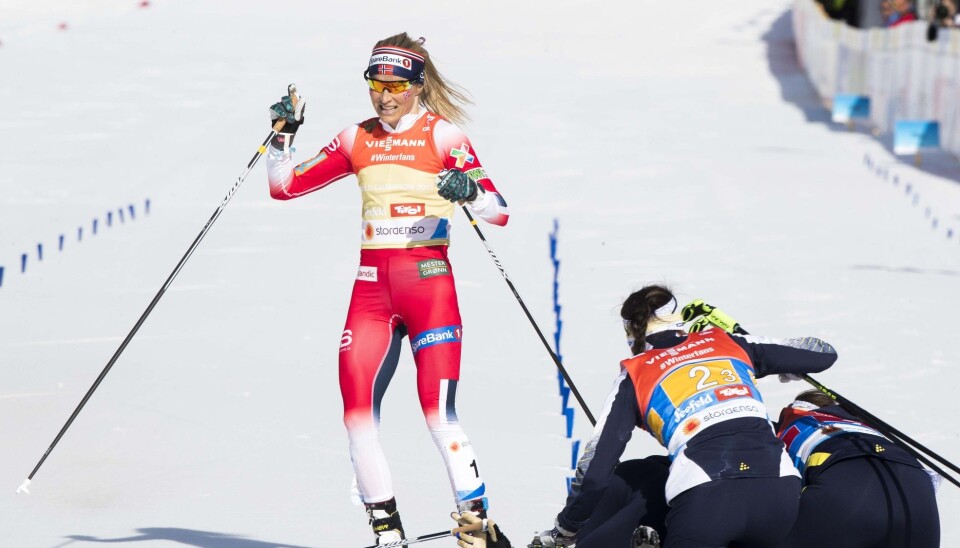
Doping scandal covered very differently by Swedish and Norwegian media
There’s a long-standing rivalry between Sweden and Norway that plays out in sports competitions, such as Nordic skiing. When one of Norway’s biggest cross-country skiing stars tested positive for doping, the Swedish press covered the matter much more aggressively than Norwegian journalists.
It’s hard to underestimate the importance of skiing in Norway, particularly cross-country skiing. While many Western countries revere their football stars, Norway’s most admired athletes are inevitably skiers. So when one of Norway’s star female skiers, Therese Johaug, tested positive for a banned substance in October 2016, Norwegians were deeply shocked.
But in the months that followed, Swedish and Norwegian media painted very different pictures of the scandal — and of Johaug, according to a new study in the journal Nordicom.
Norwegian media avoided calling the case a doping scandal, and at times they described Johaug as an innocent victim, while Swedish media described a very different situation.
Elsa Kristiansen at the University of South-Eastern Norway and Ulrik Wagner at the University of Southern Denmark have now undertaken an analysis of several hundred articles on the scandal to see how sports play into defining the larger relationship — and rivalry — between these neighbouring Scandinavian countries.
Watching the fallout from abroad

When the doping news broke, the two researchers happened to be in South Korea.
They followed the media storm from a distance, along with a Swedish colleague.
“There were differences, and we thought it was interesting. Ulrik Wagner and I agreed to start saving stories about the case,” Kristiansen said.
The two researchers have gone through texts from the websites of VG, a Norwegian tabloid; Aftenposten, Norway’s largest newspaper based in Oslo; nrk.no, the website for the Norwegian Broadcasting Corporation; the Swedish tabloid newspaper Expressen and svt.se, the Swedish Broadcasting Corporation. The researchers say there are clear national differences in the overall coverage.
Lip salve contained banned drug
The saga began in August 2016 when Johaug, then 28, was training at high altitude in Seiser Alm, Italy. Her lips were severely sunburned during training, so the ski team’s doctor purchased some lip salve that he assured Johaug did not contain any banned substances.
Johaug said she believed the team doctor, who got it wrong — one of the lip salves contained clostebol, an anabolic steroid that is on the World Anti-Doping Agency’s prohibited list. The drug showed up in a subsequent urine test and Johaug was banned from competition for 18 months. She returned to the sport in April 2018.
When the Swedish media wrote about Johaug, they described her as guilty of doping, and that the case was part of a larger problem with Norwegian doping, according to a press release from Gothenburg University’s Nordicom Centre, which published the new study in its journal.
The Swedish media were more critical of the use of drugs among Norwegian athletes, and they emphasized the idea that athletes have to accept personal responsibility for the drugs they take.
But why did Norwegian and Swedish media handle the case so differently?
National identity plays a role
In their efforts to explain the reasons why the Johaug case was handled so differently on the Swedish and Norwegian side of the border, the researchers looked more closely at how media coverage is linked to national identities in Norway and Sweden.
For example, they saw that Norwegian media presented Johaug as a victim of a system that failed, while they rarely saw the same in Swedish media.
The fact that media in different countries cover doping cases differently is not new, they wrote in the study.
“We didn’t take a stand in the Johaug case. But we generally saw that you often think more highly of your own athletes than athletes from other countries,” Kristiansen said.
A national disgrace?
Doping cases are hard on the image we generally have of sport as a clean competition between athletes whose only difference is grit, determination and training. But national identity itself can also be at stake, according to Kristiansen and Wagner.
The researchers used the example of Finland, which suffered a sense of national shame when two Finnish skiers were convicted of doping in 2006.
Something similar might have happened in Norway, the researchers wrote. Norway has played an important role in anti-doping efforts, and perhaps the media can be affected by the threat of national shame.
“Similarly to other studies, our study shows that a nation’s own media can exhibit a desire to protect its own national identity linked to a sport by defending the athlete under accusation,” the researchers wrote.
Not quite black and white
The coverage in the Swedish and Norwegian media was not all black and white, however.
For example, Johaug was confronted by Norwegian media with the fact that she claimed that she always checked two or three times to make sure the drugs she was prescribed did not contain banned substances.
This did not seem to match up with her story that she innocently trusted the team doctor when she started using the lip cream containing the banned steroid.
A soft-power strategy for two rival countries
The researchers believe the rivalry between Norway and Sweden can explain why the Swedish press covered the matter more aggressively than Norway.
“In Sweden you are always compared to the successful Norwegian cross-country teams. Swedish cross-country skiing has a little brother complex,” Wagner said in the University of Gothenburg press release.
But the larger issue revolves around the peaceful comparisons and differentiation that athletic competitions provide nations.
Sport, they wrote, “fulfils the role of a soft-power strategy used by nations to position themselves within a global competitive foreign policy landscape.” Hence, when a Norwegian athlete stumbled, Sweden pounced.
--------------------------
Read the Norwegian version of this article at forskning.no































